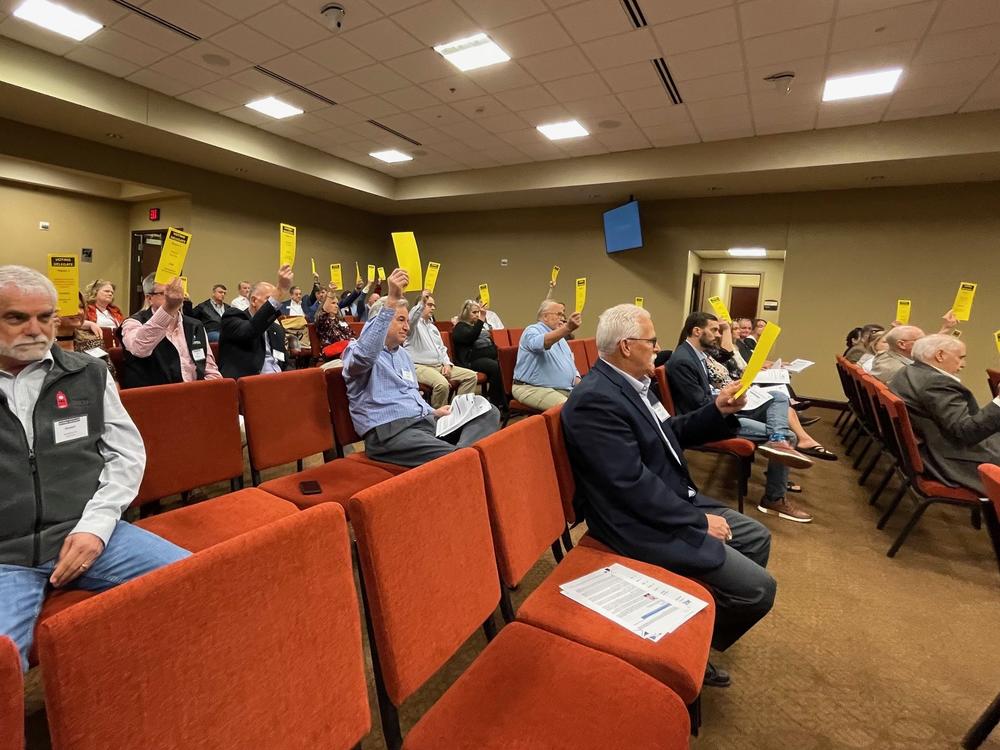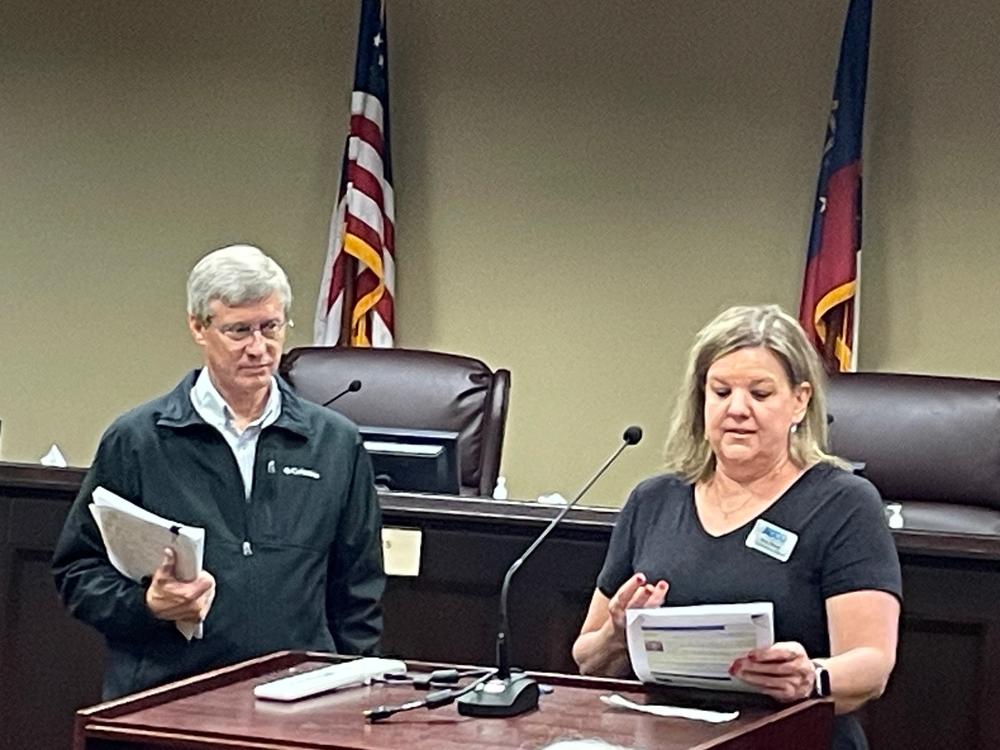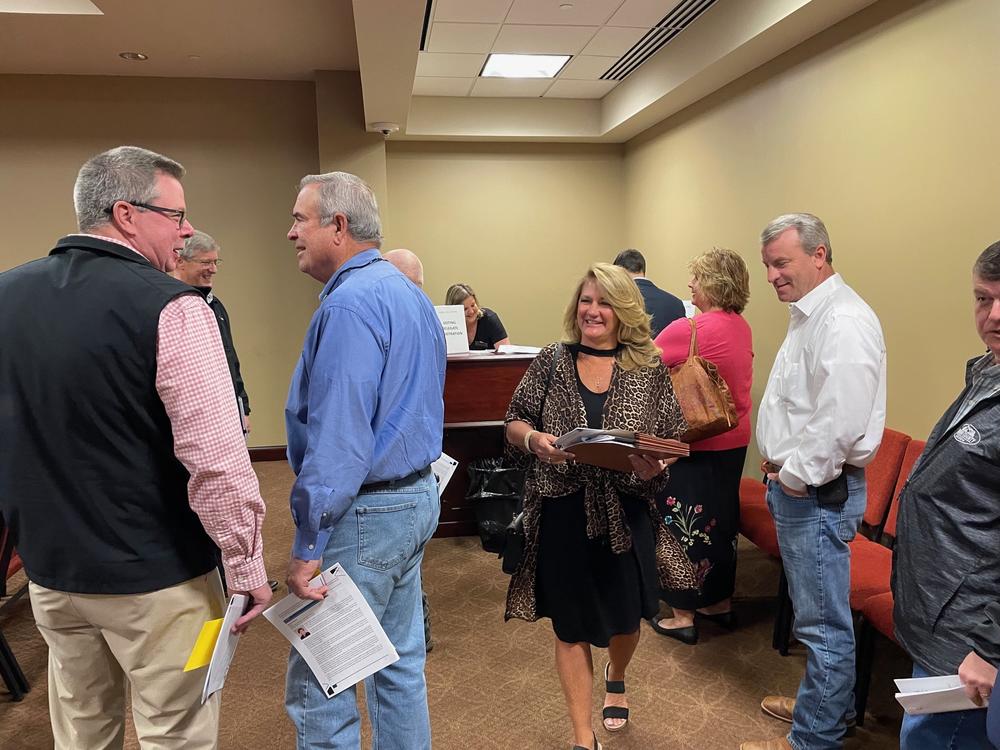
Caption
Delgates vote by holding up yellow cards in the audience at the Dawson County government building March 21, 2024.
Credit: Ellen Eldridge / GPB News
LISTEN: The Association of County Commissioners of Georgia is hosting elections for regional advisory councils this month. Those selected will recommend how best to spend their communities’ share of opioid settlement money. GPB’s Ellen Eldridge has more.

Delgates vote by holding up yellow cards in the audience at the Dawson County government building March 21, 2024.
Addiction is a disease that punishes the person as much as the people who love them.
That’s why part of the solution is to empower local communities to decide how best to fund the programs they need most.
Money to address the ongoing opioid epidemic comes from the companies that profited most during the opioid crisis.
Cardinal, McKesson and AmerisourceBergen — the nation’s three major pharmaceutical distributors — and opioid manufacturer and marketer Johnson & Johnson settled their lawsuits for $26 billion.
Georgia’s share is just over $636 million. That money is coming in across 18 years, and must be spent for prevention, treatment, recovery, and harm reduction programs.

Dave Wills stands next to Beth Brown at the podium during a March 21 meeting.
Dave Wills, the executive director of the Association of County Commissioners of Georgia (ACCG), said the portion of the opioid lawsuit settlement funds earmarked to be spent regionally — $191 million — hasn’t been budgeted yet.
The process to allocate that money involves regional advisory councils (RACs) that will review funding requests and make recommendations to Kevin Tanner, commissioner of the Georgia Department of Behavioral Health and Developmental Disabilities.
The governor appointed Tanner as the trustee for the state’s settlement money, which includes the $191 million for regional use.
Participating local governments to Georgia’s Opioid Distributor Settlement, including cities, counties, sheriff's offices, community service boards, hospitals and hospital authorities, submitted their recommendations for advisory council members.
The ACCG decided seven members of each RAC would include an academic member with a school of public health or nursing; a substance use provider licensed by the Department of Community Health; a sheriff or representative appointed or designated by the sheriff; a representative from the judiciary; an executive director with one of the state’s 16 community service boards; and a person with lived experience.
“To identify qualified nominees — and we didn't have the expertise to do this — we reached out to a host of other organizations for recommendations,” Wills said.
The ACCG’s Beth Brown said 34 of 54 delegates from North Georgia voted for seven regional advisory council members March 21 in Dawson County.

Cindy Levi, center, is an elected member of the Region One Advisory Council for opioid settlement funding.
Cindy Levi is one of the seven people unanimously elected to represent Region 1.
“I'm the CEO of one of the community service boards, and we are the state safety net for behavioral health services, which does include substance use services,” she said.
Those kinds of services saved Kaila Sprouse’s life.
Sprouse is not personally representing a regional advisory council, but she is a person with lived experience who traveled to the state Capitol earlier this year on behalf of recovery programs and help for people in behavioral health crisis.
Like she was, when a crisis intervention center in Gainesville admitted Sprouse.
“I called them," she said. "I said, ‘Hey, you know, I'm full-blown addiction right now. I lost my mind. I need help.’”
For aftercare and ongoing treatment, Sprouse connected with a residential treatment center, but it was in Atlanta, 60 miles away.
Money for programs approved by the Region 1 council affect communities north of the metro Atlanta area, such as Forsyth County, where residents are asking for more mental health resources.
Grants from this regional pot of money might help.
“Now we understand that very soon there's going to be an electronic portal open by the state where eligible entities that apply for funding will submit their applications,” Wills said. “Our understanding is that the regional advisory councils will receive those applications from their region. So, they can begin to review those, when those recommendations are made.”
After reviewing funding requests, RACs will make recommendations that, ultimately, will be approved or not by Tanner.
The RACs are also responsible for providing annual reports concerning regional funding requests to Tanner.